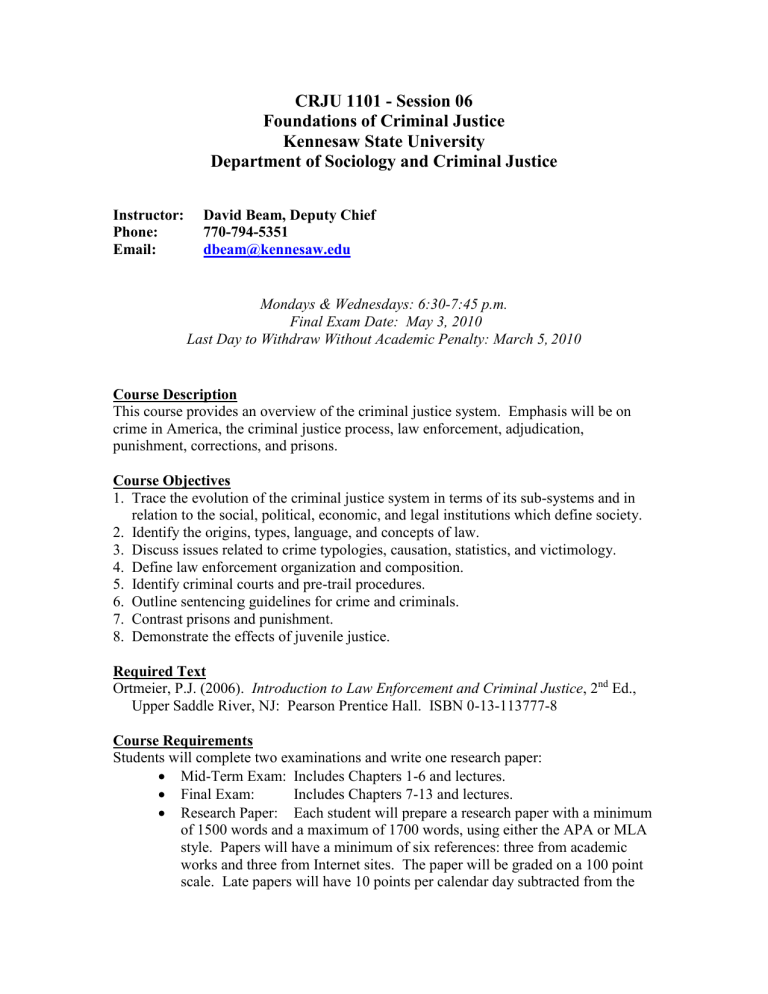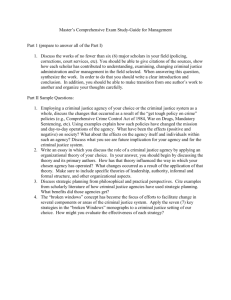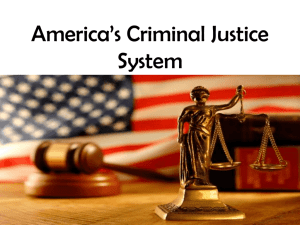
CRJU 1101 - Session 06
Foundations of Criminal Justice
Kennesaw State University
Department of Sociology and Criminal Justice
Instructor:
Phone:
Email:
David Beam, Deputy Chief
770-794-5351
dbeam@kennesaw.edu
Mondays & Wednesdays: 6:30-7:45 p.m.
Final Exam Date: May 3, 2010
Last Day to Withdraw Without Academic Penalty: March 5, 2010
Course Description
This course provides an overview of the criminal justice system. Emphasis will be on
crime in America, the criminal justice process, law enforcement, adjudication,
punishment, corrections, and prisons.
Course Objectives
1. Trace the evolution of the criminal justice system in terms of its sub-systems and in
relation to the social, political, economic, and legal institutions which define society.
2. Identify the origins, types, language, and concepts of law.
3. Discuss issues related to crime typologies, causation, statistics, and victimology.
4. Define law enforcement organization and composition.
5. Identify criminal courts and pre-trail procedures.
6. Outline sentencing guidelines for crime and criminals.
7. Contrast prisons and punishment.
8. Demonstrate the effects of juvenile justice.
Required Text
Ortmeier, P.J. (2006). Introduction to Law Enforcement and Criminal Justice, 2nd Ed.,
Upper Saddle River, NJ: Pearson Prentice Hall. ISBN 0-13-113777-8
Course Requirements
Students will complete two examinations and write one research paper:
Mid-Term Exam: Includes Chapters 1-6 and lectures.
Final Exam:
Includes Chapters 7-13 and lectures.
Research Paper: Each student will prepare a research paper with a minimum
of 1500 words and a maximum of 1700 words, using either the APA or MLA
style. Papers will have a minimum of six references: three from academic
works and three from Internet sites. The paper will be graded on a 100 point
scale. Late papers will have 10 points per calendar day subtracted from the
overall score of the assignment. The paper may be submitted early if the
student wishes. Spelling and grammar will be graded. You may select your
topic from anything covered in the course and if you need assistance selecting
a topic, contact me. I recommend you review your topic with me before
starting the paper.
Course attendance is crucial to learning the subject matter of the course. You
will earn 3 points of final exam extra credit for attending at least 27 of the 30
class periods. If you attend less than 27 class periods, you receive no extra
credit. The points are added to the grade of the final exam, not to the final
overall course grade.
Grading
Your final score is calculated using the following guide:
Mid-Term Exam 33.3% March 3
Research Paper 33.3% Due April 14
Final Exam
33.3% May 6
Extra Credit
Students are awarded two points per KSU Writing Center mentoring session, up to six
points. Each mentoring session is expected to be a minimum of twenty minutes. The
points are added to the grade of the final exam, not to the final overall course grade.
Students should attend to learn, not just for extra credit.
Class Activities
Class time is devoted to discussion, lecture, assignments, and reviews. Guest lecturers
and films are a part of the course and exam questions may be taken from the information
presented. Changing circumstances may lead to adjustments in course assignments and
scheduling.
Students with Disabilities
Any student with a documented disability needing academic adjustments must notify me
as soon as possible. Verification from KSU disabled student support services is required.
All discussions will remain confidential.
Academic Honesty
The Undergraduate Catalog contains the general policies, regulations of student life, and
the Academic Honesty policy. Read and follow the policy. Plagiarism and cheating
benefits no one and will be dealt with swiftly once detected.
Class Schedule
Date
Activity
January 11
Introductions & Class Overview
January 13
Chapter 1: Pages 1-19
January 18
No Class – Martin Luther King, Jr. Holiday
January 20
Chapter 1: Pages 20-35
January 25
Chapter 2: Pages 36-55
January 27
Chapter 2: Pages 55-73
February 1
Chapter 3: Pages 74-91 & Internal Affairs Speaker
February 3
Chapter 3: Pages 91-106
February 8
Chapter 4: Pages 107-123
February 10
Chapter 4: Pages 123-136
February 15
Chapter 5: Pages 137-152 & M-STAR Program Speaker
February 17
Chapter 5: Pages 152-165
February 22
Chapter 6: Pages 166-179 & Community Policing Speaker
February 24
Chapter 6: Pages 179-193
March 1
Review for Mid-Term Exam
March 3
Mid-Term Exam
March 8
No Class – Spring Break
March 10
No Class – Spring Break
March 15
Chapter 7: Pages 194-213 & Hiring Process Speaker
March 17
Chapter 7: Pages 213-226
March 22
Chapter 8: Pages 227-242 & Police Pursuit Video Presentation
March 24
Chapter 8: Pages 242-260
March 29
Chapter 9: Pages 261-274
March 31
Chapter 9: Pages 274-289
April 5
Chapter 10: Pages 290-304 & SWAT Speaker
April 7
Chapter 10: Pages 304-318
April 12
Chapter 11: Pages 319-339 & Criminal Investigation Speaker
April 14
Chapter 11: Pages 339-351, Research Papers Due
April 19
Chapter 12: Pages 352-375
April 21
Chapter 12: Pages 375-381
April 26
Chapter 13: Pages 382-404
April 28
Review for Final Exam
May 3
Final Exam







